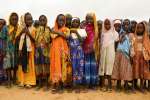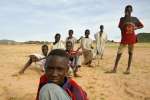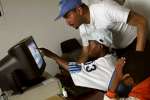- Text size
 |
|  |
|  |
| 
- Français
Refugee-run school gives children a chance at education in Malaysia
News Stories, 7 January 2010
KUALA LUMPUR, Malaysia, January 7 (UNHCR) – The afternoon sky is overcast, dark and heavy with rain clouds. Undaunted by the impending downpour, a few dozen children begin a game of softball in an open field.
"This is their hour of freedom. They can run around outside after being indoors all week. I don't think they care about the rain," laughed John, their teacher.
The young man and his students are ethnic Chin refugees from Myanmar, living in the concrete jungle of the Malaysian capital, Kuala Lumpur. Out of the 71,400 refugees and asylum-seekers registered with the UN refugee agency in Malaysia, some 10,000 are school-age children but they have no access to formal education. To fill this gap, many refugee communities set up their own education centres in the cities and towns where most of them live.
John is a volunteer teacher at a school run by a refugee group called the Chin Students' Organization (CSO). The school is basically a flat above a shop in central Kuala Lumpur. Nearly 200 refugee children sit on the floor in small classrooms to learn English, mathematics, science and Chin cultural studies. The once-weekly sports session is also part of the curriculum.
"CSO started this school because our children could not attend the public schools," said CSO coordinator Hup. "The children did not learn enough in Myanmar, so if they also have no education here, their lives in the future will be very hard."
The school is run by a handful of refugee and Malaysian volunteers who teach five days a week. Funding for the school comes primarily from the monthly fee of about US$5 paid by parents, and from donations from non-governmental organizations and private individuals. UNHCR provides text books that are used in the Malaysian curriculum.
Sisters Lidia, 12, and Sonia, six, both attend the school. "We came to Malaysia one year ago, and I began to attend this school immediately," said Lidia. "I like being in school and learning new things, but Sonia could not attend school at first. She was frightened of men, of police. She would not leave our flat." Attending school has helped her younger sister emerge from her shell, Lidia added.
"It is so important for the children to attend school – not just for education," said Hup. "They learn team work, discipline, cleanliness and self confidence."
The volunteers do all they can to help the children remain in school, even providing free lunches. "Many children do not have enough to eat at home, so coming to school means they will have a full stomach each day," said Hup.
Peter has two sons attending the CSO school and even though he's been out of work for four months – refugees often have a tough time getting regular employment because of their illegal status – he made sending his children to school his priority.
"Never mind the expensive rent or the living conditions – I can live with that," said Peter. "What is important is that I can send my children to school safely."
Even though the school is located less than 100 metres from his flat, he still walks the children to and from school every day.
"This is not like in their village. This is a city, it is not safe for them to walk on the streets by themselves," Peter explained. "They don't speak the local language. If something happens to them, how will they take care of themselves?"
It is this fear that makes most refugee parents keep their children indoors when they are not at school. No wonder, then, that the children relish the once-weekly sports session where they can release pent-up energy.
While the lessons are important to 14-year-old Sui, it's clear she prizes the games even more. "I am very good at softball. I think I am better than the boys," she said with pride. "It feels very good when I beat the boys – I feel like I can do anything."
And the school gives her a chance to dream of a different future. "What do I hope for in my future?" asked Sui. "Peace. I just want a life of peace."
By Yante Ismail in Kuala Lumpur, Malaysia











































